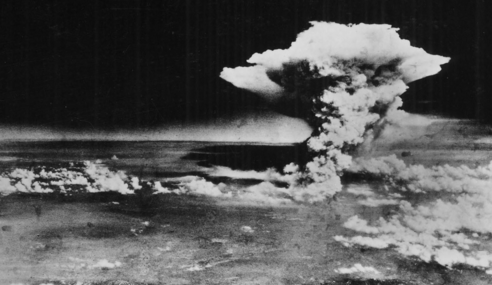Submitted by Charles Knighton
He also said there was no Japanese effort to seek a US apology, ‘nor is there any interest in reopening the question of blame for the sequence of events that culminated in the use of the atomic bomb.” Unnamed senior US official, “Kerry plans no apology for wartime atomic bomb” – April 11 Advocate
It’s quite possible that I owe my existence to the A-bomb. 71 years ago this August, my father was on a troop ship off the coast of the Philippines, awaiting the order to invade Japan. He’d seen heavy combat in Europe, with the 86th Infantry Division, and was among the first US troops to cross the Rhine into Germany.
But every available American soldier—more than 750,000—had been summoned for the final battle of the war. In the first wave of the invasion, 14 combat divisions were to land on Kyushu, the southernmost of Japan’s main islands. Another 22 divisions, including my father’s, would land three months later on Honshu, and fight their way through Japan’s formidable defenses to Tokyo. My father, then 20, did not have high expectations of returning home.
Then the US unveiled its doomsday weapon. Historians are still debating the morality—and necessity—of Hiroshima and Nagasaki. But according to my father, among the soldiers who were to be part of the invasion force, there was only gratitude. I will never forget his words: “We cried with relief and joy. We were going to live. We were going to grow up into adulthood after all.”
Their lives, and mine, were purchased at a price: To shock the enemy into submission, the US deliberately targeted civilians, incinerating more than 200,000 men, women and children. And from that day forward, we’ve had to live with the knowledge that a single madman, with a single bomb, could turn entire cities to ash. At least nine nations now possess nuclear weapons, with more surely to come; we can only wonder if the world has seen its last mushroom cloud.





The blogmaster invites you to join the discussion.